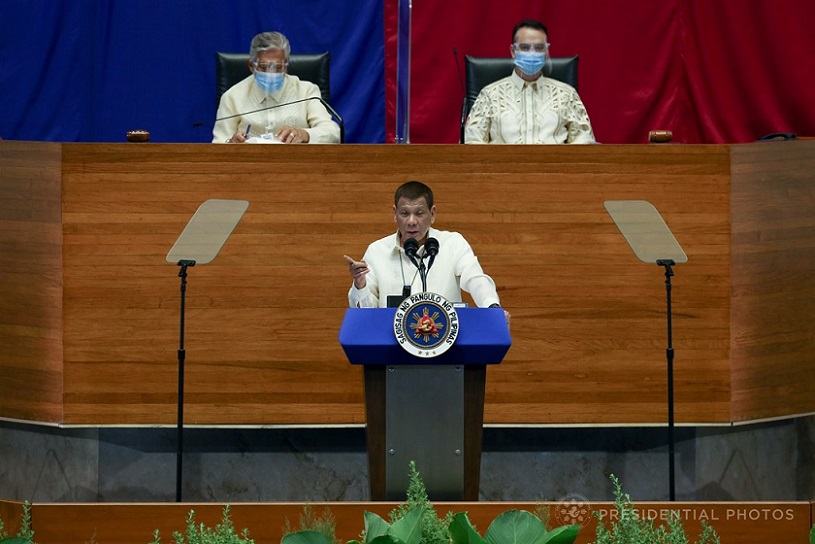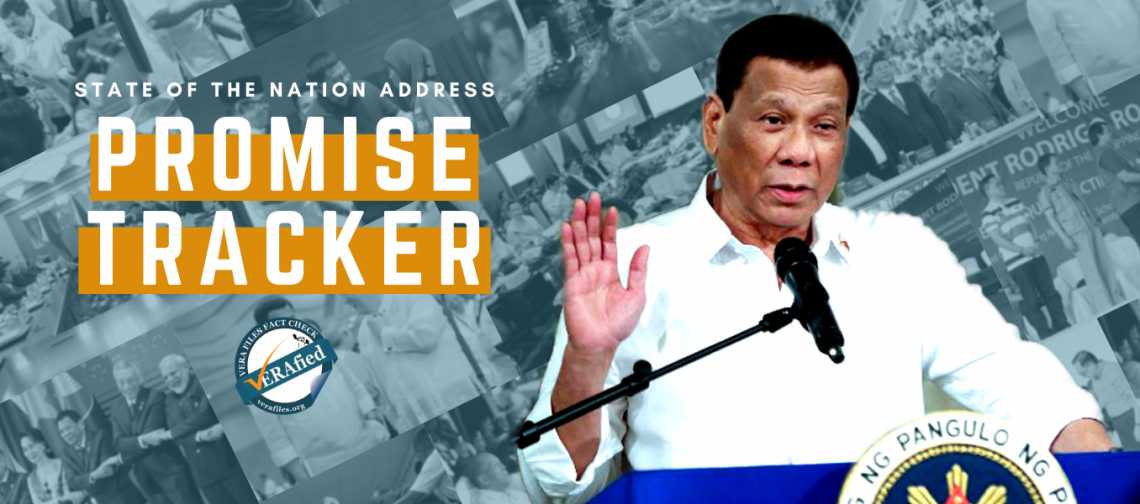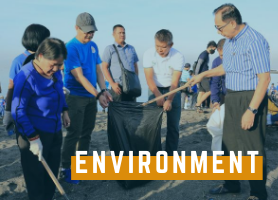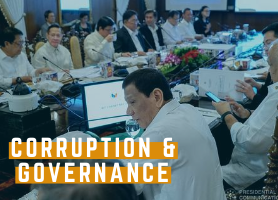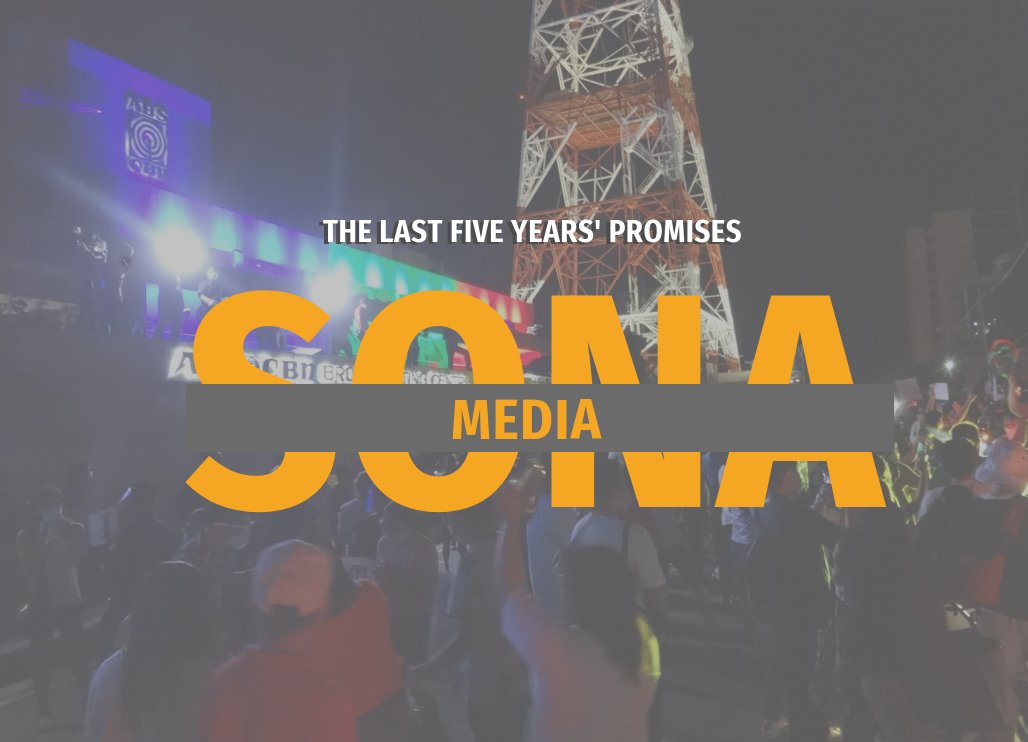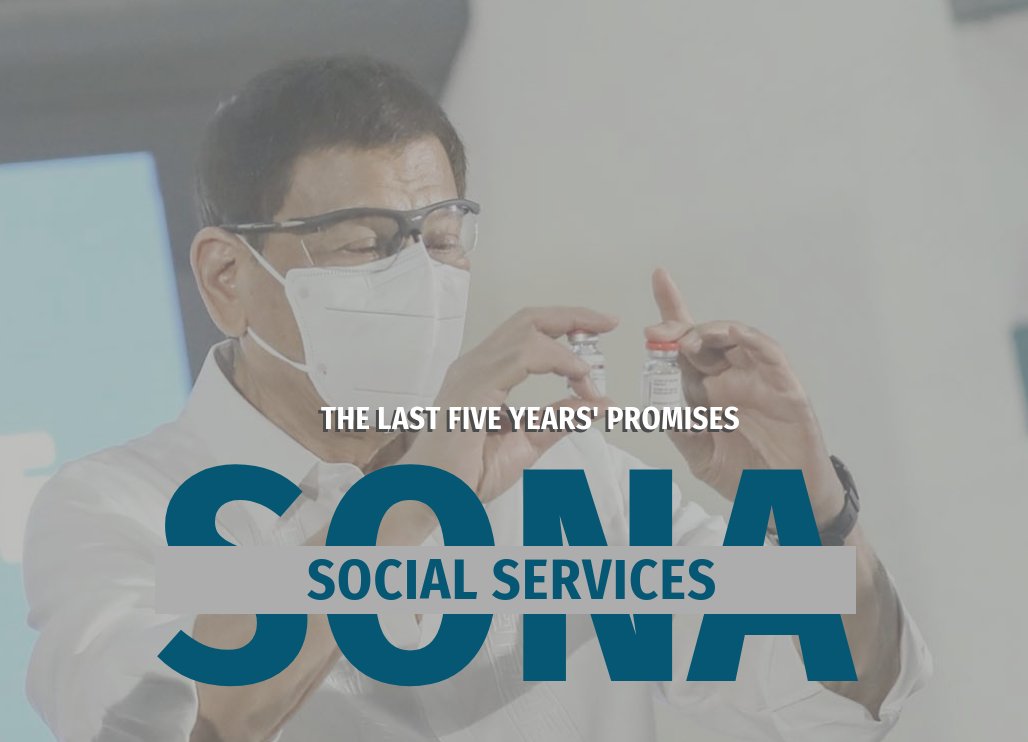President Rodrigo Duterte on Monday vowed support for business in order to rev up the economy that has been ravaged by the effects of the COVID-19 pandemic, while threatening the country’s major telecommunications companies with expropriation if they do not improve their services by December.
“The government will intensify its efforts to help businesses, especially micro, small and medium enterprises or MSMEs by providing responsive government assistance and services, capitalization and business operations support as we adapt to the next normal,” he said during his State of the Nation address that was attended by only a select audience as part of the safety and public health protocols.
The chief executive also called on Congress to fast-track the passage of proposed measures such as the Corporate Recovery and Tax Incentives for Enterprises (CREATE) Act, combination of fiscal and non-fiscal incentives, to facilitate the country’s economic recovery.
The country’s gross domestic product shrank by 0.2 percent in the first quarter of the year, compared to the same period last year. The economy is expected to have slowed down further in the second quarter when the impact of the pandemic had been mostly felt.
Labor officials say about 17 million Filipinos have lost their jobs as businesses were forced to stop or scale down operations because of lockdowns imposed to stem the spread of the coronavirus.
Towards the end of his address, Duterte veered away from his prepared speech to castigate Globe Telecom and Smart Communications for their poor service and gave them until December to improve their service or face closure.
“If you are not ready to improve … I might just as well close all of you … I will take them. The government will expropriate (the companies),” he said.
“I have two years. The next two years will be spent improving telecommunications of this country without you. I will find a way. I will talk to Congress and find a way how to do it,” he added.
The two companies are partly owned by families who have been identified by the government as oligarchies.
One other family which earned the ire of Duterte is the Lopez family, who lost their license to operate ABS-CBN after the House of Representatives, packed with allies of the president, denied its franchise renewal just last July 10.
“Media is a powerful tool in the hands of oligarchs like the Lopezes who used their media outlets in their battles with political figures. I am a casualty of the Lopezes during the 2016 election,” Duterte declared during his SONA, lending credence to allegations that political motivation was behind the House Committee’s vote to “kill” the network.
During his address, Duterte declared that the coronavirus, which caused the pandemic which has spared no country, will soon “be laid to rest”. He said: “Do not despair. The vaccine is around the corner.”
He also said that he has asked President Xi Jinping that if China does come up with a vaccine, that they allow the Philippines to be one of the first to avail of it. “If we have to buy it … that we will be granted credit so that we can normalize as fast as possible.”
The Philippines is part of the World Health Organization-led solidarity trial to test drugs in treating COVID-19.
There have been no recent reports that a vaccine has been developed to fight the virus, as Duterte suggested in his speech. More than 16.2 million coronavirus cases have been recorded worldwide. In the Philippines, the number has spiked over the last several days, reaching 82,000 cases as of July 27.
During his address, his fifth since he came to power, Duterte reiterated his stand on two issues that have taken up much of his policy speeches: his anti-drug war and his government’s position on the West Philippine Sea dispute with China.
To help stop the drug problem, he asked Congress to revive the death penalty through lethal injection, adding this would “save our children from the dangers posed by illegal and dangerous drugs.”
He said: “Drugs syndicates continue to operate just like (in) the countries of Colombia, Mexico and is being played inside the national penitentiaries.”
On the WPS territorial dispute, Duterte admitted he was useless as a leader because he will not go to war against China.
“China is claiming it. We are claiming it. China has the arms. We do not have (them). It’s as simple as that.
They are in possession of the property so what can we do? We have to go to war? I cannot afford it. I am inutile (useless) in that I cannot do anything.”
Duterte said the Philippines will continue to pursue an independent foreign policy. He said he had nothing against the United States but he would not allow the return of military bases to the country.
He says he learned a few weeks ago about plans by the United States to return to Subic, where they operated a naval base for decades. “If you put bases here at this time … if war breaks out and there will be atomic arsenals brought it, this will ensure the extinction of the Filipino race,” the president warned.
More highlights:
On social services:
To address the social services sector in this year’s SONA, Duterte made mention of the government’s efforts to address the needs of people who are badly affected by the current pandemic.
This included the Social Amelioration Program mandated by the Bayanihan to Heal as One Act to provide subsidy to 18 million low-income families, as well as the Pantawid Pamilya Program which benefited “over 4.3 million poor families,” according to the president.
After admitting that the government “encountered difficulties ramping up [the country’s] testing capacity,” Duterte pronounced that it is targeting to finish 1.4 million tests by the end of this month.
He also promised that by 2021, more than 20,000 healthcare workers will be hired and deployed “particularly in isolated and disadvantaged areas” in the Philippines, as a way of increasing access of Filipinos to healthcare services.
However, despite agreeing last July 20 on Education Secretary Leonor Briones’ proposal of allowing limited face-to-face classes in low-risk areas, Duterte seesawed back to his original position, saying he will not allow physical teaching and learning as long as there is no COVID-19 vaccine.
The President also touched on other key achievements his administration was able to accomplish in the social services sector for the past year, such as the passage of the Salary Standardization Law, the institutionalization of Malasakit Centers, and the establishment of a National Academy of Sports.
On the West Philippine Sea:
Like in his previous SONAs, Duterte assured Filipinos that the government is working “without fail” to protect the country’s rights in the South China Sea “neither beholden or a pawn to anyone.”
In his 2019 address, he said: “When we may take the next steps in our smoldering controversy over the lines of our arbitral ruling, the West Philippine Sea is ours. There [are] no ifs and buts.”
Over a month after his SONA 2019, however, Duterte flip-flopped and said he and Chinese President Xi Jinping had agreed to “ignore” the Philippines’ historic win on the South China Sea dispute at the Permanent Court of Arbitration (PCA), to pursue joint oil and gas explorations in disputed maritime areas.
The 2016 PCA ruling invalidated China’s nine-dash line claim and declared certain features in the South China Sea to be within the Philippine exclusive economic zone.
The president also repeated his false claim from his 2019 SONA that China is “in possession” of the West Philippine Sea. While China, indeed, possesses seven reefs in the oil-rich Kalayan (Spratly) Island Group and exercises control over Panatag (Scarborough) Shoal, other claimants, including the Philippines, occupy other reefs and features in the disputed areas.
The tough-talking president — who once said he would “ride a jet ski” to the disputed areas carrying the flag of the Philippines to stake the country’s claim — said, “unless we are prepared to go to war, I would suggest that we better just call off and treat this as just a diplomatic endeavor…China has the arms, we do not have it.”
On the Philippines’ warm ties with China, Duterte said he “made a plea” to Xi that, should China develop a vaccine for COVID-19, they “allow us to be one of the first” to be given access. The Palace earlier said this is not far off since the two countries are “BFFs (best friends forever).”
On media:
Duterte opened and closed his address criticizing “oligarchs like the Lopezes,” contradicting the Palace’s supposed “neutral stance” on the denial of broadcast giant ABS-CBN’s legislative franchise earlier in July. This time, he also slammed Senate Minority Leader Franklin Drilon for “defending” the Lopezes, whom he described as “economic elites…who use their media outlets in their battles with political figures.”
Duterte also mentioned that government-run television frequencies would be used to “provide uninterrupted quality education” to students amid the “shift to e-learning” during the COVID-19 pandemic. The proposal was first introduced by Deputy Speaker Luis Raymund “LRay” Villafuerte, one of the 70 lawmakers who killed ABS-CBN’s franchise bid, through House Resolution No. 1044.
On the economy:
Leading
off with a mention of the country’s maintained BBB+ (stable) credit
rating from S&P; Global early on in his speech, Duterte described the
Philippines as having a “strong fiscal position” that may help it
weather the crisis caused by the COVID-19 pandemic.
He urged
Congress to quickly pass the Bayanihan to Recover as One Act—a follow-up
to his earlier Bayanihan to Heal as One Act—which will supplement funds
for recovery and response against the impact of the pandemic. Other
pieces of legislation he pushed for immediate passage are economy
recovery packages such as the Corporate Recovery and Tax Incentives for
Enterprises (CREATE) Act, which will benefit companies with corporate
tax cuts particularly the micro, small and medium enterprises (MSMEs)..
He
also called again for the enactment of a coco levy law that will create
a trust fund for the tax levies collected from coconut farmers during
the martial law era of late President Ferdinand Marcos. Duterte vetoed a
version of the measure in 2019, citing opposition to the creation of a
perpetual fund.
On infrastructure:
Duterte
did not go into detail about the Build, Build, Build (BBB) program, but
said it will not be just a “mere springboard” for the country’s
recovery from the pandemic. Expected to generate 1.5 million jobs by the
end of the year, the BBB will offer economic benefits “to be
distributed to all corners of the country and push sustainable stability
in the urban centers, particularly Manila,” said Duterte.
Instead
of elaborating more on the BBB project during his fifth SONA, he said a
comprehensive report will be published after his SONA.
On corruption and good governance:
Duterte
welcomed the passage of the law to postpone the barangay and
Sangguniang Kabataan elections, which was one of his promises from his
previous SONA. He also reiterated his vow to simplify government
services, as well as to strengthen e-governance or offering government
services via online platforms. These are still in progress as some
e-channels have only been introduced recently.
On corruption,
there was noticeably no mention of alleged corruption in the Philippine
Health Insurance Corporation, which received special attention from him
in his 2019 SONA. He also called Sen. Franklin Drilon a “hypocrite” for
wanting to pass an anti-political dynasty law.
On illegal drugs:
President Duterte renewed his call on Congress to revive the death penalty by lethal injection, saying this “will not only help us deter criminality but also save our children from the dangers posed by illegal and dangerous drugs.”
He said he would later share a story why drug syndicates continue to operate in the Philippines, just like in narco-states such as Colombia and Mexico, and that “it is being played inside the national penitentiaries.”
Duterte lamented that some dealers and distributors of illegal drugs have been taking advantage of the COVID pandemic to step up their activities. “The amount of shabu valued at millions of pesos seized during police operations ((during the community quarantine) speak volumes of the enormity and weight of the problem that we bear,” he said.
On human rights:
Duterte said his administration “will not dodge our obligation to fight for human rights.” This was in view of criticisms from no less than the United Nations High Commissioner on Human Rights on the “heavy-handed approach” in dealing with national security threats and illegal drugs that has resulted in serious human rights abuses.
“My administration always believed that freedom from illegal drugs, terrorism, corruption and criminality, is itself a human right,” he said.
He cited efforts to uphold and protect the rights of children, in particularly through the signing of in 2019 of Executive Order No. 92 creating the National Council Against Child Labor that was meant to prevent, reduce and eliminate any form of child labor.
On soldiers’ pension:
“There is a need to adjust the pension system which will be applicable only to the newly hired uniformed personnel so as not to cause a ballooning effect against the budget of the military in the years to come, and yet maintain the pension benefits of those already in service under the present law,” Duterte said in appealing to Congress to pass the pending bills on this.
On boosting local tourism:
Noting the “remarkable emergence” of Boracay Island to its former glory, Duterte sought the passage of a law creating the Boracay Island Development Authority, or BIDA, to sustain the development on the world-famous vacation destination.
He called on national and local government agencies to harmonize their tourism policies in order to boost local tourism, a sector heavily struck by the coronavirus disease (Covid-19) pandemic.
“We enjoin our people to help boost the economy by traveling locally once the necessary systems are in place,” he said.
On the creation of a Department of Disaster Resilience:
Again, the president repeated his previous appeal to Congress to enact a law that would create a Department of Disaster Resilience and People’s Safety before another big disaster strikes the country. He underscored the importance of putting up an evacuation center in every city, province and municipality across the country. He said this cannot be done by local government councils or commission.
-with contribution from Meeko Angela Camba, Chi Liquicia, Jo Cumuyog, Anthony Cuaycong, Bryan Manalang, Reiven Pascasio, Merinette Retona, Elijah Roderos, Celine Isabelle Samson, Ivel John M. Santos, Laurice Sy, Klaire Ting, Ellen Tordesillas, Tita Valderama.
